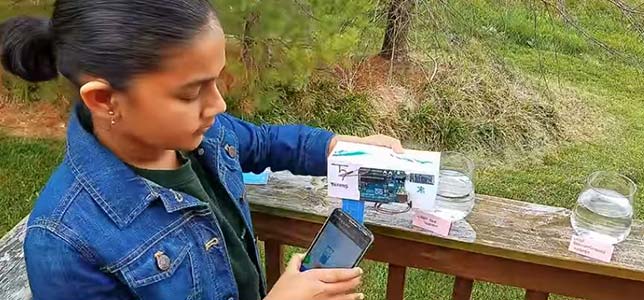Young Scientist Challenge Seeks Middle School Innovators
- By Dian Schaffhauser
- 01/04/18

This year's Young Scientist Challenge will award access to 3M scientists who will serve as mentors to help students pursue their innovative ideas. These "young scientists" (from grades 5-8) will also be eligible to receive a considerable amount of money; the grand prize is $25,000. Finalists chosen through a video competition will travel to St. Paul, MN, where they'll receive a tour of 3M headquarters and meet with a distinguished panel of judges.
Last year's winner in the Discovery Education/3M Young Scientist competition was 11-year-old Gitanjali Rao from Lone Tree, CO (pictured above), who developed a low-cost, portable and simple-to-use solution for testing water for lead. Inspired by the continuing water crisis in Flint, MI, Rao worked with 3M Scientist Kathleen Shafer on development of "Tethys," which has three parts: a disposable cartridge using carbon nanotube arrays, an Arduino-based signal processor with a Bluetooth attachment and a mobile app. The sensor-based device displays the water status on the app almost immediately.
Competing against Rao were nine other finalists, who also received cash and other prizes, including access to taping of one of Discovery's shows.
The challenge was launched by Discovery Communications in 1999; by 2008 it had teamed up with 3M to promote creative problem solving among students and give them access to 3M's considerable band of scientists.
Finalists are chosen from among all entrants, based on the creativity, scientific knowledge, communication and overall presentation of the videos they submit. The 10 highest-scoring entrants are named as "finalists" with the opportunity to participate in a summer mentorship program and final event activities.
To enter, students need to submit a one- to two-minute video in which they describe a new invention or solution that addresses an everyday problem that directly affects them, their families, their communities or the global population. The problems could surface in numerous areas, including manufacturing, energy, safety, healthcare or transportation.
Videos must be submitted by April 19, 2018. Judging begins in May.
Learn more on the Young Scientist Lab site.
About the Author
Dian Schaffhauser is a former senior contributing editor for 1105 Media's education publications THE Journal, Campus Technology and Spaces4Learning.